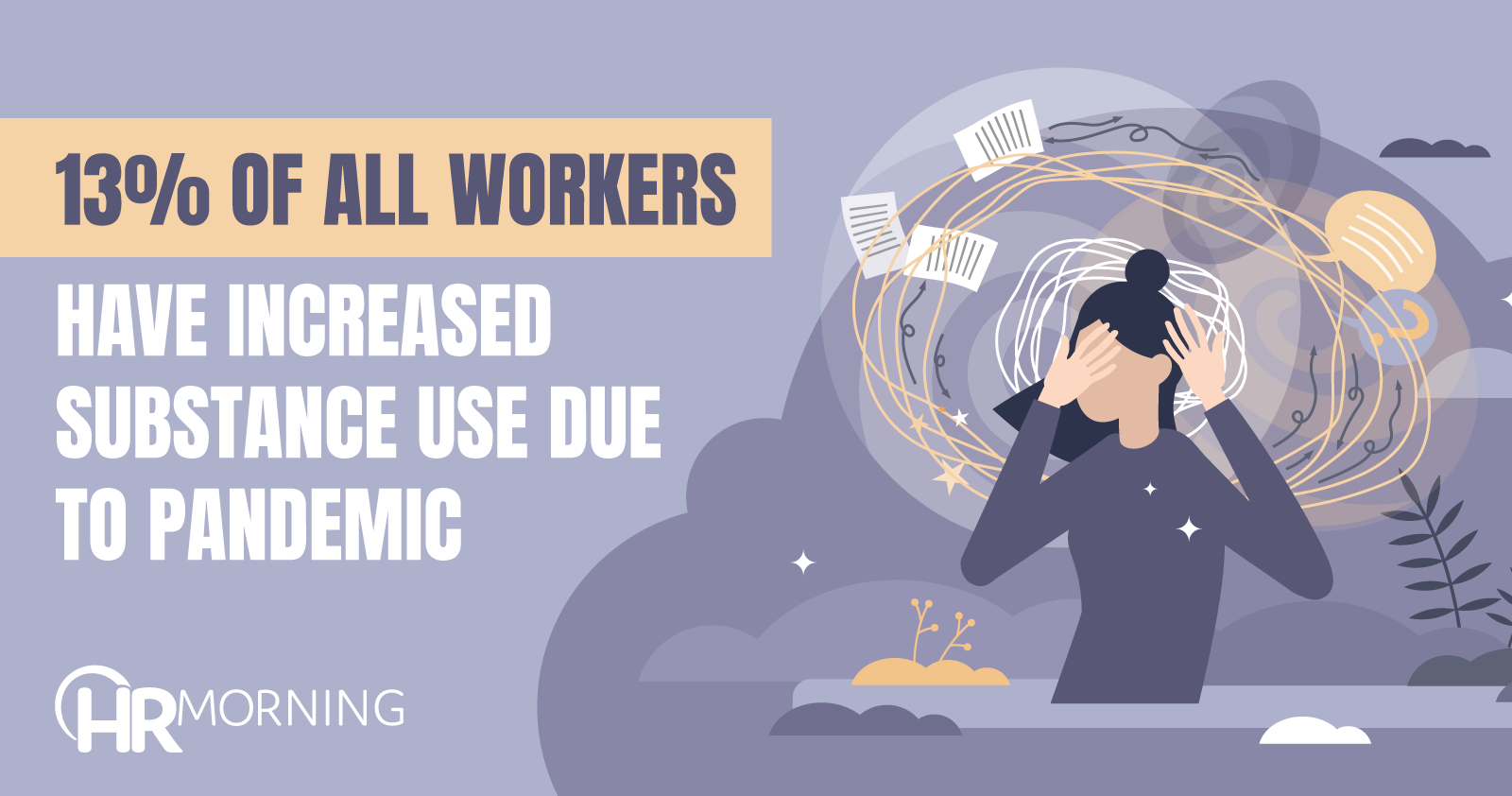Does your company offer benefits to help employees with substance use disorders (SUDs)? If not, it’s extremely important.
Here’s why: Benefit pros know the mental health toll the pandemic has taken on workers – increased depression, anxiety, and isolation/loneliness. So, they’ve spent the past year and a half trying to find the best mental health benefits. But new data shows more employees are turning to drugs and alcohol to cope.
Specifically, 25% of essential workers and 13% of all workers said they’ve increased their substance use due to the pandemic, reported Spring Health from the American Psychological Association.
Now, you don’t have to be a doctor to know substance abuse increases physical and mental health issues. But guess what? It also makes the user more susceptible to COVID-19! And it doesn’t stop there. It makes those who get COVID-19 and have SUDs more likely to experience complications from the virus, like hospitalization and death. That’s according to a Molecular Psychiatry study on COVID-19 and outcomes in patients with substance use disorders.
That’s not going to help in your quest to keep healthcare costs down.
What does that mean for Benefits pros?
Most employees aren’t going to tell you they have a SUD. But you can provide the tools they need via benefits to help them recover.
SUD signs
Don’t assume just because an employee exhibit one or two of these signs that they have a SUD. Instead, use them as possible indicators and talk with the employee.
Here are some SUD indicators:
- Excessive absences
- Diminished job performance
- Accidents and near-accidents
- Difficulty concentrating, and
- Bad judgement.
Substance abuse doesn’t just have to be illegal substances. Alcohol is a prime one for many workers who have SUDs. Addressing the issue, especially at work, is a sensitive matter.
One reason SUDs carry a stigma with them and the people who suffer with SUDs know it. Therefore, they fear judgement, and many are ashamed. So, the last thing they’re going to do is come to you for help.
To bypass the stigma, just as is being done with mental health benefits, use “stigma-free” language in your benefits materials. Refer to SUDs as an illness, just like diabetes and depression.
Most importantly, let employees know, the company is there to help them, not judge them. Especially since the pandemic has caused so many workers to increase their use of substances.
Helping employees with SUDs
Here are best practices from Recovery Friendly Workplace on how to broach the subject:
- Make sure you have documented evidence of SUD indicators or behaviors before you meet with someone you suspect of having an SUD.
- When you do meet with an employee, do it in a private, calm environment. This reduces feelings of being attacked, shows them you respect their privacy and provides them with a safe place to talk and, hopefully, open up.
- Talk about what you or their supervisor has observed and concerns you have. For example, “I’ve noticed you haven’t been your usual upbeat self lately, and you’ve been late to work and meetings. Is everything OK?”
By starting off the conversation like this, it gives the employee a warm, friendly, concerned feeling, instead of being attacked. - The goal is to get them talking. Just know, nine out of 10 times, they’ll deny there’s a problem. And that’s OK. People don’t get over SUDs overnight.
- Provide them with a list of benefits they can use, such as mental health services. Even if you’re wrong and they don’t have an SUD, there may be something else bothering them that talking to a mental health professional would help. Plus, talking to a professional not associated with their work makes them less afraid of losing their job.
One size doesn’t fit all
Treatment for SUDs varies. But talking to a healthcare professional is the first step in determining the right path of care. Typically, counseling, and behavioral therapies are involved. But some people may need medically assisted detoxification. If so, it’s only a first step in treatment. Supportive therapies are still needed for long-term success, as you must treat the whole person, not just their SUD.
In fact, years of research from Substance Abuse and Mental Health Services Administration (SAMHSA) has shown the best predictors of a successful substance abuse treatment are:
- Gainful employment
- Family support, and
- Lack of co-existing mental illness.
Therefore, if you can offer help through your benefits, that person has a better chance of kicking the habit because they’re gainfully employed. Also, by showing you care and offering benefits – whether it’s for an SUD or mental health help – make the person more likely to reach out on their own.
Here are some sources you can access for more information on SUDs:
- National Institute on Drug Abuse: Drugs, Brains, and Behavior – The Science of Addiction National Council on Alcoholism and Drug Dependence
- Alcoholics Anonymous
- Narcotics Anonymous
- Al Anon
- Smart Recovery Stat Sources and References


